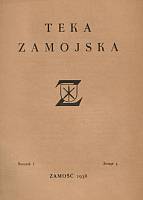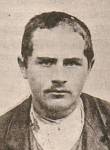 Below
is a summary of an article from a quarterly publication "Teka Zamojska" ("Zamosc
Files"), fascicle 3, 1938 entitled "Battle at Zwierzyniec in 1906".
Described there is Antoni Wajszczuk from Sitaniec, his activities and fate
as a young independence fighter and member of the Combat Organization of
the Polish Socialist Party (http://en.wikipedia.org/wiki/Combat_Organization_of_the_Polish_Socialist_Party) which
was at that time led by Jozef Pilsudski, the future Chief of State and
Marshall of the free and independent Republic of Poland after World War I
(Józef
Piłsudski)
Below
is a summary of an article from a quarterly publication "Teka Zamojska" ("Zamosc
Files"), fascicle 3, 1938 entitled "Battle at Zwierzyniec in 1906".
Described there is Antoni Wajszczuk from Sitaniec, his activities and fate
as a young independence fighter and member of the Combat Organization of
the Polish Socialist Party (http://en.wikipedia.org/wiki/Combat_Organization_of_the_Polish_Socialist_Party) which
was at that time led by Jozef Pilsudski, the future Chief of State and
Marshall of the free and independent Republic of Poland after World War I
(Józef
Piłsudski)
This Organization was formed to prepare the
military cadres in anticipation of the approaching struggle for the
liberation and independence of Poland, avenging the cruelty and
oppression by the Russian Tsarist officials and the secret police and
finally, to provide cash for the military training and maintenance of
the Organization. This last objective was accomplished by attacking the
postal trains and postal vans.
This publication and article were discovered in
the National Library in Warsaw by our friend and close collaborator,
Wladyslaw Sobecki. During the early stages of
our genealogical search, at one of the meetings with members of the
Zamosc branch of the Family, somebody mentioned a book published before
the World War II in which some Wajszczuks were described. No further
details could be obtained at that time. According to these report, some
family members from Sitaniec were arrested by the Russian Army Cossacks
before or during WW I or Polish-Soviet War (http://en.wikipedia.org/wiki/Polish-Soviet_War),
jailed, send to exile in Siberia
(katorga”) and were not heard from anymore. At that time we were given
the names of Antoni (0449) and Pawel (0450), sons of Pawel (0404) from
Sitaniec (//www.wajszczuk.pl/english/drzewo/zamojszczyzna_pawel.htm).
Their exact dates of birth were not known and it was suspected that they
both were arrested (and died?) at the time of the Polish-Soviet war in
1919?. A subsequent review in August 2006 of
the registry books of the Sitaniec Parish for the years 1872-1905 in the
National Archives in Zamosc documented the births of three oldest sons
of Pawel (0404) - the first one, Antoni was born in 1883 but died in
1886. After him, Piotr was born in 1885 (and not a Pawel, as we were
told earlier!) - no further information about him could be found sofar!
In 1888, another son was born, who was named again Antoni (perhaps in
memory of the yongest child, who died in 1886?). It seems that this is
Antoni Wajszczuk described in the article mentioned above!
(At the present time, the fate of his older
brother Piotr, who was also supposedly arrested at the same time [?], is
not known. We have some information about the fate of Pawel's (0404)
other oldest children and their families, except about Jerzy, who was
born in 1895).
St. Andrzej Radek.
Bitwa pod Zwierzyncem w 1906 r. ("Battle at Zwierzyniec in 1906"). ;
TEKA ZAMOJSKA, zeszyt 3, rocznik 1, Zamość 1938.
Summary: (in English): The
article contains a description of an attack on Russian Tsarist postal
vans on a road between Bilgoraj and Zwierzyniec. (see
map). The attack detachment travelled from Lublin on July 4,
1906 – the group was guided by Antoni Wajszczuk, son of the "wójt"
(elected mayor of a rural commune - gmina) of Sitaniec.
 A
fighter, "full of zeal, extremely brave, although of small stature,
knowing well this region". There were seven of them and they were
planning to attack the postal vans transporting the collected tax
money. Many formations of Russian cavalry and Cossacks were stationed in
the area, therefore the success of the action was dependant on quick
attack and then quick withdrawal into the surrounding forests.
A
fighter, "full of zeal, extremely brave, although of small stature,
knowing well this region". There were seven of them and they were
planning to attack the postal vans transporting the collected tax
money. Many formations of Russian cavalry and Cossacks were stationed in
the area, therefore the success of the action was dependant on quick
attack and then quick withdrawal into the surrounding forests.
Unfortunately, several delays
developed and they were not quite ready, when the postal vans approached
the previously selected place of ambush - they were forced to attack in
a less favorable location. There were three horse drawn wagons with 14
soldiers - the second one carried the safe with cash. Exchange of rifle
fire frightened the horses, the first and third wagon run off the road
and became trapped among the trees, but the second one with the money
the horses pulled straight down the road and after a short while it
disappeared from sight. Strong Russian reinforcements arrived from the
nearby barracks and the fighters were forced to withdraw and hide in the
forest. Subsequently they arrived at the nearby village, where
the locals supplied them with the peasant garbs and some of them were
able to escape from the encirclement. Unfortunately some of them were
soon captured.
Wajszczuk
hid all their Mauser rifles and Browning pistols under his clothes,
calmly walked into the nearest house from which he soon walked out
carrying a crib containing a baby and calmly walked away from the
encircling Cossacks into the surrounding fields. (...) He arrived at
Sitaniec, spent a night with the relatives but, unfortunately was
captured next morning while looking for his friends and trying to find
out about the results of the battle. Suddenly the Cossack appeared,
captured him, tied with a rope and transported to Szczebrzeszyn, where
he was beaten almost to death while refusing to answer their questions.
After four days, he was transferred with other captives to the Lublin
Castle jail. One week later, four of them were transferred to the Xth
Pavillion of the Warsaw Citadel. On the 28 of September 1906 the Russian
military court sentenced all of them to death by hanging. Subsequently
the sentences were reduced - to "katorga" (deportation to Siberia and
hard labor) 'till life-end for two of them and 20 years for Wajszczuk
(and Janiszewski) -
Janiszewski died there after 3
years. Antoni Wajszczuk was sent to the Smoleńsk Gubernia and died there
– it is not known, when.